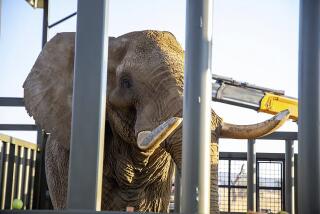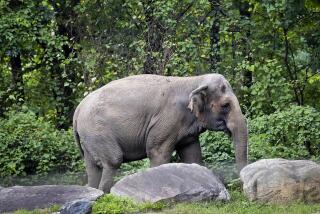A Tropical Asian Home Where Baby Elephants Can Freely Roam : In Sri Lanka, a unique government orphanage protects the cherished beasts amid coconut groves, rice paddies and tea plantations.
- Share via
The smallest of the elephants--they might have been twins--lagged behind the herd and seemed to be playing hide-and-seek among the coconut palms. They stopped to rub their ears against the trees until a stick-wielding keeper, the mahout, hurried them along.
I stood just steps away in this hushed green glade that the Sri Lankan government recently set aside as the nation’s first official elephant orphanage. No fences or moats separate the 40 or so young elephants from their visitors--only common sense and the sharp-eyed mahouts, who indicate to move forward or get back.
Sri Lanka cherishes its elephants: About 2,000 live in the wild and another 500 work on building sites and in timberland. The orphanage was established in the village of Pinnewala as the nation’s population grew and spread farther into the countryside. Some villagers, angered when elephants tore out new fences and trampled their gardens and homes, had shot adult animals. The government began rounding up the babies for protection.
The preserve, with its rushing river and ridge-top rest huts, is about 48 miles from Colombo, just off the jampacked road to ancient Kandy. Because of the traffic, the trip by car takes more than two hours. If you like elephants, it is worth it. In fact, if you want to see something of the lush green countryside of old Ceylon, it is worth it.
Once out of Colombo, tiers of rice paddies glitter in the tropical sun as women in saris and gold earrings bend to set out seedlings. White egrets pose against lime-green grass. Cups hang from spindly trees on rubber plantations; primitive sawmills buzz through teak logs.
Country commerce is specialized. Gampaha is known for its pineapples, and stall after roadside stall offers pyramids of golden fruit. Another village is famed for cashews; baskets heaped with nuts are displayed on rickety tables. Cane furniture is the next town’s craft.
Teen-age hawkers wave and beckon for you to stop. Schoolchildren in white uniforms smile as you pass. The robes of Buddhist monks add streaks of saffron.
As for the madhouse traffic along the two-lane route, it’s worse than Cairo or Rome. Not in numbers of vehicles, but in diversity. “It’s like allowing roller skaters and dog-walkers on your freeways,” a Colombo hotel man had warned me.
Almost everything weaves. Nissan motorbikes weave precariously around lumbering ox carts and cut between passing buses. A glut of bicycles, motorcycles, flatbed trucks, tractors, vans, fuming three-wheelers, sedans, tour buses, taxis, oxen and donkeys presses for position. The line between the lanes is obliterated, and the dirt shoulders are too packed with pedestrians to offer escape.
Horns honk constantly. Women in silk saris glide along the roadside beneath bright parasols, seemingly oblivious to imminent death. All you can do is pray that your driver can maneuver with one hand while answering his cellular phone.
Almost halfway to Kandy, a cheery sign of a baby elephant pointing with his trunk marks the turnoff onto road B-9, and with it comes a measure of peace. Now at an elevation of 800 feet, the land is cooler and within sight of the hills where the tea plantations begin. Bamboo grows as tall as 40 feet high.
At the Village Spice Market in Pinnewala, by the entrance to the elephant preserve, a youngster named Salila told me that sandalwood powder was good for pimples, coconut oil for sunburn and cinnamon oil for bad breath. Her father was sipping coconut water, straight from the coconut, and claimed it was good for hangovers.
The elephants’ milk-feeding schedule was posted by the gate: five times a day between 6 a.m. and 8 p.m. But another sign proved the only disappointment: “No Baths Today.”
Having previously come upon that spectacle in the rivers of India, I’ll never forget the silly charm of an elephant lolling in ecstasy while the mahout clambers to scrub a mighty leg and wash behind an ear.
More to Read
Sign up for Essential California
The most important California stories and recommendations in your inbox every morning.
You may occasionally receive promotional content from the Los Angeles Times.













